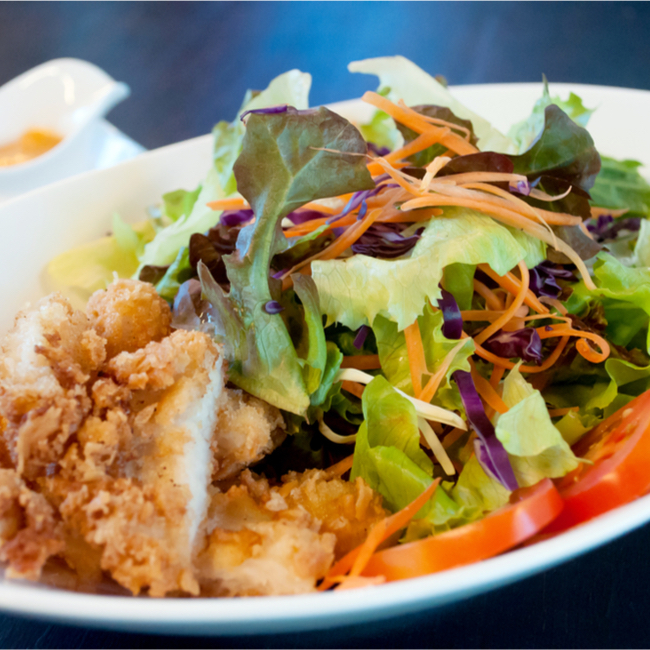
Salads With Unhealthy Toppings
Whether you’re a picky eater, aren’t sure what to order or just want to get an ample intake of vegetables, choosing a salad can be a convenient, comfortable and quick option when going out to eat. While salads seem like an obviously healthy choice, Richards advises paying attention to the contents of the one you select, and why certain ingredients can pack on extra calories without you realizing.
“Many fast food companies are catching on to the fact that Americans are getting tired of being unhealthy,” says Richards. “This has led to the development of many ‘healthy’ menu items and in some cases even menus dedicated to nutrient-dense and low calorie food items.”
Among these menu items, Richards says, are some “decent, and even exceptional, salad options.” However, when it comes to eating a fast-food salad, Richards notes that there are certain nutrition guidelines to follow to avoid eating hidden calories.
“Avoid fried proteins like chicken fingers and opt for grilled versions instead,” says Richards, noting that “grilled or smoked chicken” provides lean protein without the excess calories and fat from frying and breading. Steak, she says, can also be a decent protein, but “you'll want a leaner cut of beef.”
As for toppings, Richards advises staying away from fried onions and croutons, as they are “two toppings that quickly add empty calories, carbs and fat to a fast-food salad.”
Lippert agrees that foods that are breaded and deep fried can set back your weight loss progress. “These foods are inflammatory due to the trans fats found in the frying oils, which penetrate into the foods you eat,” says Lippert. “Consuming foods that contain a significant amount of trans fats can lead to weight gain.”
Optimal Salad Ingredients When Ordering Out
Apart from grilled versions of your favorite proteins as opposed to fried, you’ll want to select a salad that is prepared with nutrient-dense toppings, Richards explains. This includes “black beans, avocado, tomato, cucumber, low fat cheese, corn, peppers, and other fruits and vegetables.” Richards also says that “romaine lettuce or a mixed green blend is preferred over iceberg lettuce” as the nutrient content is greater.
Overall, you don’t have to stop ordering salads completely in 2022, but rather avoid ordering them blindly or assuming that they’re healthy without looking closely at their ingredients. This means steering clear of fried proteins, fattening toppings and the type of lettuce— all of these can impact your weight loss journey and can be easily switched out for a lighter option!
Foods Cooked In Oil
Unfortunately, some menu items that would be healthy on their own can actually be detrimental to your health if they contain certain types of oil. For this reason, Bradley tells us you should avoid oils when eating in a restaurant.
"Vegetable oils that restaurants use are highly processes and stripped of nutrients," he warns, listing canola and soybean oil as a few examples of inflammatory oils that could negate the health benefits of, say, a side of otherwise nutritious vegetables. Say it ain't so!
While it may seem impossible to avoid oils altogether, Bradley offers a word of advice: pay attention to how the food is cooked. "It's better to order foods that are stewed, oven-roasted, or steamed," he tells us. When in doubt, you can always ask your waiter!
Diet soda
When you're choosing a beverage to accompany your meal at a restaurant, you may think diet soda is the best option—but that isn't necessarily the case. Although diet soda is certainly better than its sugary, high-calorie counterpart, this drink can still have negative consequences on your health. We spoke to Doebrich to learn more about the possible fallbacks of this drink.
She says one reason you may want to avoid diet soda if you're looking to lead a healthier lifestyle is the fact that the artificial sweeteners could lead to increased sugar cravings. "Some sources suggest that diet soda may increase sugar cravings," Doebrich warns. "This is believed to be due to triggering sugar receptors." So, when you choose a Diet Coke with your meal, you may ended up indulging in a sugary dessert later.
Additionally, drinking artificially flavored diet soda could cause health issues when it comes to your gut. "Another suspected outcome of drinking excessive amounts of diet soda are changes in the gut microbiome, which have negative health outcomes," Doebrich notes.
Doebrich mentions that one study suggests the artificial sweeteners found in this low-calorie beverage can lead to digestive issues. "For some people, who are sensitive to the sweeteners used, it may cause gastrointestinal discomfort," she says. In fact, drinking any sort of carbonated beverage, regardless of what sweeteners it contains, could disrupt your gastrointestinal system and create discomfort.
Of course, drinking (mostly) anything is fine in moderation, and one diet soda with your salad every now and then won't kill you. You should simply be aware that even though this beverage may not contain any calories, that doesn't mean it's the pinnacle of healthy drinks. If you're really trying to go with the healthiest meal possible, we suggest skipping the soda altogether and going for some good old lemon water instead.


